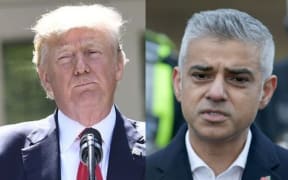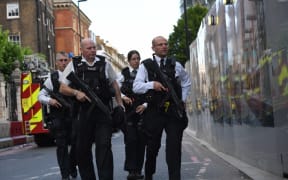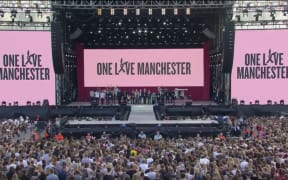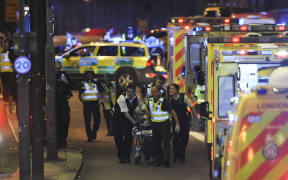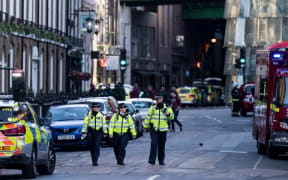Security is expected to become a major theme of Britain's election this week, following the attack on London Bridge.
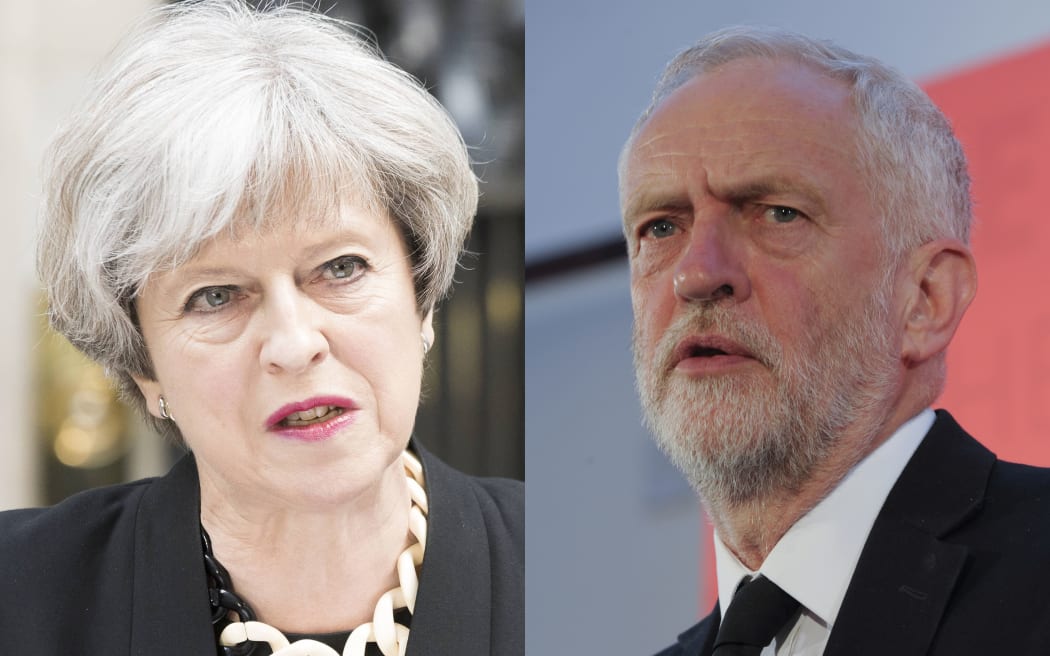
British Prime Minister Theresa May and Labour Party leader Jeremy Corbyn. Photo: AFP
Campaigning for the general election was suspended for a day by the two main political parties after the Saturday night terror attack, but Prime Minister Teresa May said the election would go ahead as planned on Thursday.
The attack, in which a van was driven into pedestrians then attackers jumped out with knives and attacked bystanders, left seven people dead and 48 injured.
Counter terrorism police were still searching four properties as they hunt for information about those involved in yesterday's deadly terror attack.
Mrs May responded to yesterday's attack in London by declaring "enough is enough" and calling for a review of Britain's counter-terrorism strategy.
She said Britain had become too tolerant of extremism and people needed to become far more robust in identifying it and stamping it out.
Labour leader Jeremy Corbyn said the terrorists "want democracy halted", and he would be resuming campaigning.
"They want their violence to overwhelm our right to vote in a fair and peaceful election and to go about our lives freely."
In an attack on Mrs May, he said "you cannot protect the public on the cheap" and called for the police and security services to "get the resources they need, not 20,000 police cuts".
"Theresa May was warned by the Police Federation, but she accused them of crying wolf", he said.
Security Minister Ben Wallace hit back at Mr Corbyn's claim.
"This was a hastily arranged speech designed to help Jeremy Corbyn run from his record on counter-terrorism policy, but it failed."
Mr Wallace claimed Mr Corbyn had "boasted about opposing every single counter-terror law" and had previously opposed the the use of "shoot-to-kill" by police.
He also claimed that Mr Corbyn had "given cover" to the IRA.
Opposition party Plaid Cymru's leader Leanne Wood said Mrs May should be the one to take responsibility if Britain had been too soft on extremism.
Mrs Wood pointed to the fact that Mrs May had been home secretary for six years prior to being prime minister.
Calls for greater internet, social media security
Mrs May also said Britain would work with other democratic governments to regulate the internet and prevent the spread of extremism and terrorist planning.
Security analyst Steven Park said the government must know of cases where people are in the country illegally, for Mrs May to have been saying what she did following the attack.
He said restricting access to Islamic State websites and removing them from the internet was similar to what China does on a daily basis.
"It's feasible for the internet providers, [if] they work closely with police authorities and the government, to at least stop some of the main websites doing what they're doing particularly the things relating to ISIS.
He cautioned that the sheer amount of information would make restricting it a daunting task, however.
"There'll be hundreds of thousands of documents on the internet and they obviously won't be able to remove them all."
In a statement issued after the attack, Facebook said it wanted to make its social media platform a "hostile environment" for terrorists.
"Using a combination of technology and human review, we work aggressively to remove terrorist content from our platform as soon as we become aware of it," said Facebook director of policy Simon Milner.
"And if we become aware of an emergency involving imminent harm to someone's safety, we notify law enforcement."
Twitter also said it was working to tackle the spread of militant propaganda on its website.
"Terrorist content has no place on Twitter," UK head of public policy at Twitter, Nick Pickles, said in a statement.
Mr Pickles said that in the second half of 2016 Twitter had suspended nearly 400,000 accounts.
"We continue to expand the use of technology as part of a systematic approach to removing this type of content."
Mr Park also said the number of people being expelled from Britain was likely to increase following the attack at London Bridge and considering Mrs May's response.
He said he expected more people to be ordered out of the country.
"If people are training people with the ideology of extremism a and radicalisation, I think it's very possible if people are here on working visas or visitors they're flouting the rules of their stay here
"And I would imagine it's perfectly feasible that we would start to see expulsions. When that would happen obviously we don't know.
British police counter-terrorism powers
RNZ London correspondent Natalie Powell said there was growing concern in Britain, given that is seems very difficult for police to stop the threat, or predict where it could be coming from.
There were 255 terrorism-related arrests in the year ending 31 March 2016, according to the latest statistics from the Home Office.
The arrests led to 37 prosecutions.
In 2015, 128 terrorist and extremist prisoners were released from custody, the Home Office says.
British Police have the ability to stop and search a suspect if they have reasonable suspicion of involvement with terrorist activities, and can hold someone in detention without charge for up to 14 days.
That limit was extended in 2006 to 28 days but this reverted in 2011 under Mrs May's watch as home secretary.
It is an offence to prepare for an act of terrorism, and not to tell police that someone is preparing for an act of terrorism can lead to a five-year jail term.
Acts of terror are not specific crimes in the UK, though perpetrators could expect to face murder and bodily harm charges.
Being a member of a banned terrorist organisation - of which there are 71 worldwide - can lead to 10 years in prison.
British Police also have powers to stop, search and hold people at ports, airports and international railway stations.
A total of 23,717 people were stopped under the power in the year ending June 2016, a fall of 23 percent on the previous year.
Despite fewer people being stopped, the number detained through such stops has increased by 7 percent, 1649 to 1760, in the same period.
- RNZ / BBC / Reuters
